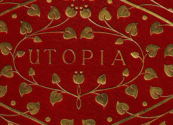Discussion questions for Bacon’s New Atlantis
by Brad Young
“I reject all forms of fiction and imposture” (Novum Organum, 598).
1) As Hogan notes, one of the most striking differences between More’s Utopia and Bacon’s New Atlantis is the lack of intentional ambiguity in the latter (39). Nowhere does New Atlantis appear to question the truth of its narrator or his interlocutors. Nor does it seem to invite any critique of the virtue and harmony of Bensalem, “so chast a Nation….the Virgin of the World” (26). How should we account for this difference?
2) In spite of his desire to set aside all preconceptions in the pursuit of knowledge, Bacon is an unapologetic eurocentrist. This attitude is most succinctly put in the quote from Novum Organum, “man is a god to man” (599). Why does this (as well as his Christian faith) escape the rejection of received wisdom articulated so forcefully in Novum? And how does Bacon justify this attitude in New Atlantis?
3) There is one thing, however, that the Europeans are not so great at: marriage. Why does this provoke such a hostile and relatively lengthy critique? Is it significant that this critique comes from the Jewish merchant? And why is chastity such a central ‘virtue’ in Bensalem?
4) What begins overflowing with Christian symbolism, ends with a long list of all the ‘worldly’ wonders apparently derived thereof (via divinely-inspired scientific study). Is Bacon attempting to reconcile science and faith, or does he genuinely see no contradiction between the two? Or is he disguising radical ideas in the acceptable language of Christianity? Related to this, I think it’s worth examining the strange statement, which ends the selections from the Novum Organum, “Only let the human race recover that right over nature which belongs to it by divine bequest, and let power be given it; the exercise thereof will be governed by sound reason and true religion” (600).
5) Considering the reception of the Bible in Bensalem via divine intervention, the island’s pacification of other nations without bloodshed (15), and expansion of knowledge through benevolent spies, is Bacon attempting to legitimize imperialism and the spread of Christianity by masking or effacing their ‘original sin’ (i.e. that they are inextricable from pervasive violence, exploitation, and domination)?


